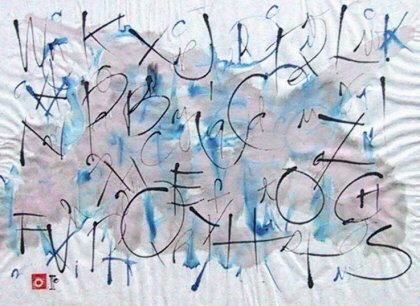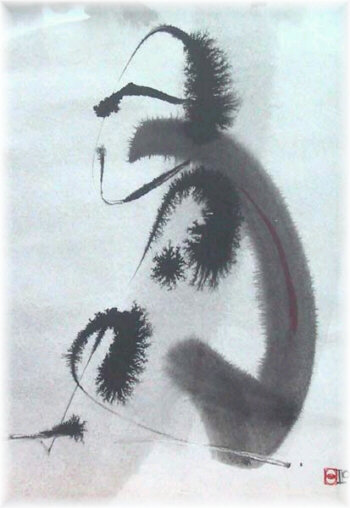 Jay Michaelson
Jay MichaelsonI did, finally, get it -- during the last days of the six-week retreat.
What opened this problem up for me was noticing how much of the I-concept was involved in every one of the Western and Buddhist "solutions" that I'd been trying. I should be more compassionate; I should understand this or that teaching of the dharma; I had this or that happen when I was a kid. It was as if, there's the world out there, doing it's thing, and then there's me, here, having some kind of reaction to it.
This is a mistake, in both Buddhist and Jewish conceptions of what's really going on right now. In Buddhist-language, our notion of the separate self is, at most, a label. If you look really closely at whatever thought or feeling you're having right now -- and I mean really closely, in a way that requires stillness and clarity -- you'll see that it is a learned behavior, conditioned by hundreds or thousands of other phenomena. You learned these words, learned how to think them, learned how to feel about them, learned opinions by which you judge them. Even if some faculties are genetically programmed, that doesn't make them any more "you" in the sense we usually use that word. When you scratch an itch, did "you" scratch the itch, or were all the conditions present (physical, mental, emotional) for scratching to happen? And, if the latter, isn't it really the conditions who scratched the itch? And who were the itch in the first place?
In Jewish-language, the conditions are God. Remember, it's not like "the conditions" are real and "you" aren't. They, too, empty phenomena, themselves conditioned by other conditions. Everything that's happening, from the photons coming from your computer screen to the feeling in your stomach, is really only happening in the mind of God. Because there's nothing separate to really be "happening" in the conventional sense: there are just lots and lots of empty conditions. Coming to see this reality -- that only God exists and that everything that seems to exist is actually empty -- is called bittul ha-yesh in the Hasidic idiom, the insight into non-self in the Buddhist one.
I loved this insight as it arose, over and over again, during the retreat. All that was happening was the great series of empty, conditioned phenomena -- including Shakey moving, including the truck, including every sound and vision.
But the piece I was missing, was that what arises inside "me" is part of the circuit too. When the conditions for anger are present, anger arises, just like an itch, or just like the sound that will arise when Shakey's feet scrape the floor. I had been feeling, unknowingly, that, yes, the shifting of feet is just the conditions; the moving around is just the conditions; but I am a putz for not being able to accept it. As in: "This is only God, dammit, can't you accept that?"
In fact, my anger is as much God (i.e., the empty phenomenon arising from causes and conditions) as Shakey's inconsideration, sloth, ignorance, whatever. It, too, is part of the web.
This was a sweet surrender. The conditions were present, the phenomena arose. And the play of life goes on, as Leonard Nimoy used to say. What's the point of being angry with anger?
Now, there are a few caveats. First, and most importantly, witnessing the unfolding of all these causes and conditions doesn't mean you don't still feel the anger. Don't worry; you do. But the feeling is experienced very differently. It's easier to laugh at, and it passes faster. It's as if the play of life is going on, and you are contributing a verse whether you like it or not.
Second, I do still think that some of my anger is "better" than other of it. Social justice, environmental justice -- these seem morally better than a desire to be a certain kind of yogi, or have a certain kind of meditation sit. But these really are the causes of the anger, not the phenomenon of anger itself. It is morally good to be motivated by injustice to oppose the systems of injustice that exist -- but the belief that that must involve anger is mistaken. In fact, as any professional activist will tell you, anger is debilitating more than it is motivating. Anger in a sort of abstracted moral sense, yes; but anger in the sense of actually feeling emotional anger -- only, at most, at occasional intervals.
Third, recognizing and surrendering to anger does not mean acting on it. If you think about it, we act on anger to be rid of it. "Goddamit, if I don't tell that jerk how I feel..." There's this belief that if I send that email, or bang against that wall, that the anger will go away, and oftentimes it does. Certainly, I don't see anything wrong with going out for a run or a bike ride to burn off some energy. But I often get rid of my anger-energy in much less skillful ways: by speaking rudely to people, or breaking things. So, learning to live with the feeling of anger in the body is, for me, a very useful skill. Okay... anger... it feels like this.
 I still get angry, particularly when my life gets so busy that I can't get any peace and quiet, and when the stress of the inbox seems to overwhelm me. And I still feel enormous shame over my anger. My father used to have a bad temper; like many men of his generation, he would yell in restaurants, and get very upset at politicians, football games, and pool-cleaning equipment. I rarely saw him violent, but I was still terrified by him when I was younger and embarrassed by him when I was a little older. I see him in myself when I get angry for forgetting my cellphone somewhere, or furious at hitting my head -- and I don't like to see that part of him in me. I feel unworthy, and I feel like a fraud, as if all my meditation practice and teaching is bullshit.
I still get angry, particularly when my life gets so busy that I can't get any peace and quiet, and when the stress of the inbox seems to overwhelm me. And I still feel enormous shame over my anger. My father used to have a bad temper; like many men of his generation, he would yell in restaurants, and get very upset at politicians, football games, and pool-cleaning equipment. I rarely saw him violent, but I was still terrified by him when I was younger and embarrassed by him when I was a little older. I see him in myself when I get angry for forgetting my cellphone somewhere, or furious at hitting my head -- and I don't like to see that part of him in me. I feel unworthy, and I feel like a fraud, as if all my meditation practice and teaching is bullshit.
But even the Dalai Lama gets angry sometimes, according to statements he's made. Being awake does not mean that the infinite chains of causality will be broken. Sure, you'll eventually grow less angry at things -- but not by trying to be less angry. Accepting, yielding, surrendering -- only that way.
In the Hasidic tradition, anger is seen as a form of idolatry, because it basically is saying "God is this way, and I reject It." This statement actually contains two mistakes. First, there is the rejecting: God has manifested as a traffic jam or an inconsiderate person, but I have a better idea about how God should look, and I'll worship that instead. Whereas the true God is YHVH: That Which Is. And second, there is the separation. God is this way, but I reject it, or feel angry about it. I, separate from God.
There is no separation. God is the arising of anger, and the feeling of it. The knower, the knowing, and the known. And also, thank God, the passing away.
In that "thank God," I think, is the beautiful conundrum of religion.




Shakey: An Essay on Anger
Jay Michaelson
Giving Thanks to Elijah the Prophet in Indian Manhattan
Jonathan Schorsch
Three Nights
Jill Hammer
The Pursuit of Justice
Emily Rosenberg
Sha'arei Tzedek
Dan Friedman
God's Unchanging Hand
Daniel Cohen
Archive
Our 610 Back Pages
Neurotic Visionaries & Paranoid Jews
April 7, 2005
Zeek in Print
Fall/Winter 2004 issue now on sale
About Zeek
Mailing List
Contact Us
Subscribe
Tech Support
Links
From previous issues:
Erev
Temima Fruchter
Carrying Light into Dark Times
Rabbi Zalman Schachter-Shalomi
The Mall Balloon-Man Moment of the Spirit
Dan Friedman
 Email us your comments
Email us your comments